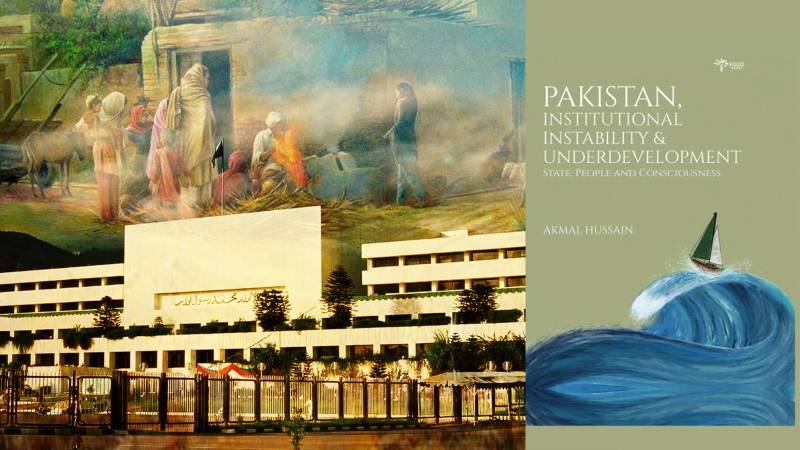
Rent Extraction by the Ruling Elite
Akmal Hussain is a distinguished professor and a prolific writer from Pakistan who has provided an interdisciplinary insight into the issues of Pakistan’s economy that reels under balance of payment crises, high inflation, and IMF prescriptions.
His central thesis is that Pakistan’s rent-based economy prevents equitable and sustainable growth. He attributes this rent seeking to the colonized mind of the elite.
Decolonizing Consciousness
The solution he offers is for the elite to decolonize their consciousness by reconnecting with the rich cultural tradition of Pakistan. This would allow them to recognize universal human solidarity instead of extracting resources for conspicuous consumption.
It would facilitate economic independence instead of reducing Pakistan to a supplier of raw materials. He refers to neocolonialism where Pakistan is subjected to IMF conditions that lead to economic stagnation and where Pakistan’s resources are extracted by foreign lenders.
He clarifies that decolonization of consciousness is not about demonizing former rulers but about shifting from an extractive economy to building human capabilities. This warrants an education system that imparts both critical thinking and compassion.
However, he states that the military, bureaucracy, the landed and industrial elite impede decolonization by perpetuating extractive institutions.
He also attributes the separation of Bangladesh to racism against the Bengali people and to systemic resource extraction, which increased income inequality between the two regions.
Pakistan: 1960s – 1990s
He adds that Pakistan’s policy makers in the 1960s followed trickle-down economics based on the idea that the rich maximize saving, investment, and growth. However, the rich did not increase savings, productivity, or innovation, and instead indulged in conspicuous consumption.
He argues that socialism pursued by Bhutto only increased the rents for the elite. This is because nationalization provided jobs and rents to favoured bureaucrats and those with political connections.
He states that even through the 1980s, the structural issues were not addressed so that low foreign exchange earnings led to an unsustainable debt burden, lack of investment in hydro power generation led to shortage of cheap electricity, and poor investment in human development impeded growth.
Even in the 1990s, Pakistan pursued IMF programs. This meant public expenditure reduction, trade liberalization, devaluation, and withdrawal of subsidies. All of this led to reduced net exports, increased inflation, and economic stagnation.
The IMF prescriptions of privatization, deregulation, and liberalization exacerbated inequality. On privatization, he adds that public assets were sold for a fraction of their value, as the private sector bribed corrupt officials.
He states that the cost of debt servicing is paid by the people through regressive indirect taxation, withdrawal of subsidies on food and electricity, and decline in public services including health and education.
The Economic Vision of the Quaid e Azam
He falls back to the Quaid e Azam, stating that his economic vision was about equality of opportunity, policy focused on human well-being, and industrialization for achieving economic independence.
Hussain adds that Jinnah’s vision was far ahead of its time, as it was only much later that the idea of human capital entered economics and long before development was defined in terms of developing human capabilities. Jinnah was clear that adopting Western economic theory would not help Pakistan achieve human wellbeing.
However, he argues that instead of Jinnah’s vision, Pakistan focused on foreign aid and imported technology, as the ruling elite aligned with Western imperialism.
He reminds us that economic equality has been enshrined in the Constitution in Article 38(a) that “the state shall secure the well-being of the people … by preventing the concentration of wealth” and in Article 38(e) that the state shall “reduce disparity in income and earnings”.
Beyond Western Economics
Moving beyond Western economics, he emphasizes compassion as the basis of public policy to combat inequality and environmental degradation, both of which are structurally rooted in the capitalist economy.
Focusing on equitable and sustainable development, he suggests providing universal healthcare, education, and social protection, developing heat resistant food grains, and building emergency food stocks.
In essence, his thesis is to shift from the rent extraction model of the Pakistani elite to a people centred economy, as per the economic vision of the Quaid e Azam. This would require the military, bureaucracy, the landed and industrial elite to decolonize their consciousness by reconnecting with indigenous folk culture that calls out for social justice and human solidarity. Once they achieve that consciousness, development by the people and for the people will follow.

